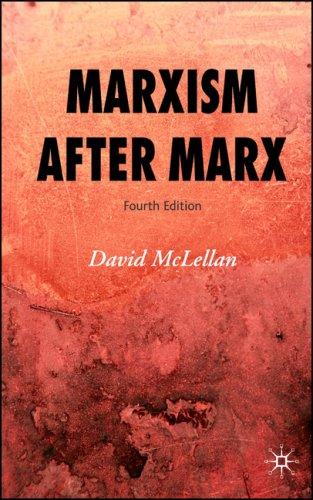When I am discussing topics on my blog I often take a stance, form an opinion. This is not done in a vacuum; I adhere certain theoretical perspectives. On this page I want to give a quick introduction on the most important ideas that constitute my paradigm. The reason for this is twofold: first, it offers me a set of concepts always to fall back on when reasoning about. Second, it is instrumental to readers who want to better appreciate and place my views.
NEO-MARXISM
In general I draw heavily on neo-Marxism. This label is used for a broad range of movements, though it is most closely associated with the intellectual left of the 1960s and 1970s. Basically, it designates efforts to amend traditional Marxism so that it fits closer to modern day developments. It moves away from orthodox determinism, without however dropping the core essence of Marxist thought. This essence is captured by:
 |
| A comprehensive introduction to the major debates in Marxist thought. Marxism After Marx offers oversight of all major currents Marx inspired. |
- Stressing historic developments, with attention for the relation to the evolving international capitalist system.
- A materialist regard of social groups (classes) and their place within the economic modes of production ánd exchange.
- Emancipation as a central goal, by focussing on unequal relations of power and their reproduction.
These elements make up the general framework by which I judge phenomena. In short I will always look for how social classes result from the relations of production/exchange. In this, classes is to be treated as more than 'capitalist' or 'laborer' - the term covers any distinct identity with a unique material position. I also recognize that identity can be fragmented, which makes analysis along these lines more complex.
A final inheritance of Marx is his dialectic method. Just like him, I favor an approach that looks into the interplay between agents and structures. This compromises between structural determinism or outright voluntarism.
GRAMSCI AND MARCUSE
These are I believe two key authors who's thoughts are required for understanding our modern day society. Both Antonio Gramsci and Herbert Marcuse can be considered neo-Marxists. Their major contribution lies in refining Marxism so that it accounts for cultural patterns.
 |
| One-Dimensional Man, the major work by Herbert Marcuse, explains his views on the position of the individual within an advanced capitalist society. |
From Gramsci I learnt that the ruling classes can acquire hegemonic power. This occurs when people freely accept the interests of the elite as their own or indeed the general interests. They take on the values and attitudes of the ruling class, however contrary to their own objective interests they might be. To achieve this, competing rulers employ their material capacity and their power over state institutions. Everyday capitalism is replicated before our eyes in schools, supermarkets and the working place.
WORLD-SYSTEMS ANALYSIS
 |
| In Historical Capitalism, Wallerstein explains the origin and expansion of the modern capitalist World-System. This work has a special attention for underdevelopment in the South. |
As analytic instrument, World-Systems Analysis is unidisciplinary: it offers an holistic explanation that combines fields of study and stresses structural relations. It also is non-positivist in that it refutes universal and a-historic laws. In stead it focusses on historic context and complexity.
The level of analysis is to be the World-System. This is understood to be an integrated system that exists in a historic period and extends over a geographical region. It is relatively isolated from regions outside the World-System, regions with which its contacts are not structural. The current world system is a capitalist World-Economy that spans over the entire world. This capitalist World-Economy is driven by capital accumulation and the interests of what by now is a transnational capitalist class. Capitalists in the core enrich themselves by exploiting peripheral classes trough unequal exchange.
Capitalism as a World-Economy experiences cyclical crises to which it responds by geographic and/or sectoral expansion. Capitalists try to make others pay for their crises (sounds familiar?) and refuse to internalize social or ecological costs. One day the final boundaries will be hit - be it depletion of resources, excessive proletarianization or ecological crisis. Then capitalism will collapse and the World-System shall be transformed. It is better to transform before crisis arrises since a collapse works politically destabilizing.

Geen opmerkingen:
Een reactie posten